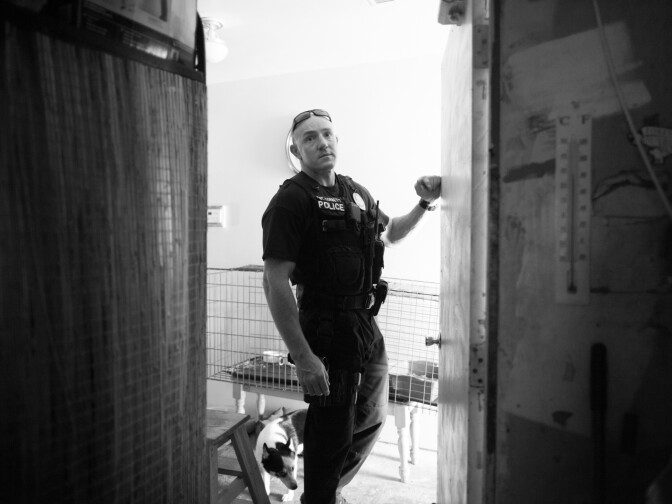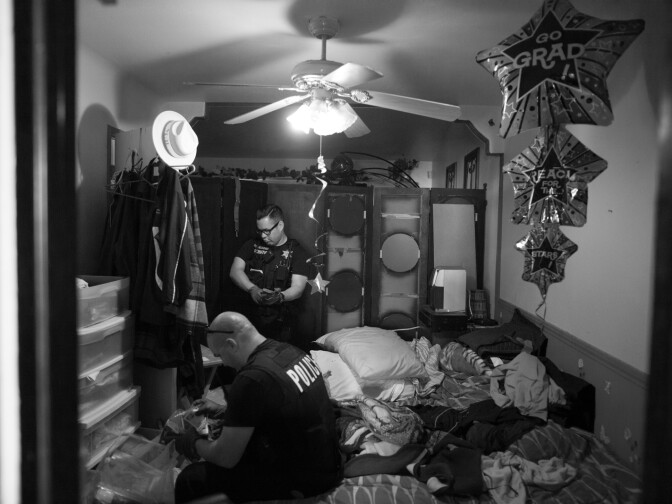This story is free to read because readers choose to support LAist. If you find value in independent local reporting, make a donation to power our newsroom today.
This archival content was originally written for and published on KPCC.org. Keep in mind that links and images may no longer work — and references may be outdated.
'Split sentencing': Los Angeles County stays away from prison alternative that Riverside County and others embrace
"Dangerous animal, coming through," calls Riverside police Detective Ron Kipp.
Behind him is a young springer spaniel named Tilly, a narcotics dog. And like most people in the room, she'd clearly rather be elsewhere.
For hours, the Riverside area compliance team rifled through drawers, checked behind a set of 50 decorative plates that line the wall, and even opened the toilet lid. They found the man's cell phone with messages from earlier in the day, asking – in not so many words – if he had any drugs. And they called in a female officer to search his girlfriend.
The man whose alleged drugs they're trying to find – a large, heavily tattooed man with ties to white power gangs on his rap sheet – sits calmly in the living room, watching an episode of “River Monsters.”
"C'mon, you're embarrassing me, Tilly," Kipp says, as the dog, lies on the bed.
Tilly eventually turns up some pipes, which earn the man and his girlfriend citations – a "frustrating" outcome, says team leader Sgt. Denny Corbett, who's still convinced there are drugs in there, somewhere.
"These guys have ways of hiding them," Corbett says discreetly.
Over the course of the day, the team has demonstrated a commitment to its mission, which is conducting compliance checks on offenders sentenced under AB109, the state's prison realignment program, enacted in 2011.
They have scaled walls to find ways onto properties and they've pawed through the makeshift bedrooms of a flophouse, looking for drugs. That sort of rigorous supervision has helped convince Riverside County's justice system to allow 67% of its AB109 offenders to serve a portion of their jail terms at home, under the supervision of the probation department, which makes them subject to searches by teams like this one.
"Split sentences" are an invention of prison realignment – one that's used to widely varying degrees in California's counties. Riverside County is at the higher end of the scale. Los Angeles County, where only 5 percent of offenders get split sentences, is near the bottom. And with L.A. County considering funneling over $1 billion into a new jail, criminal justice reform advocates are increasingly asking why the county doesn't take advantage of split sentencing, which could reduce the jail population.
L.A. County's Probation Department is also an advocate of the tool, which they believe has the potential to lower recidivism.
"That period of supervision will give us the opportunity to see if they’re on the straight and narrow, so to speak," says L.A. County Deputy Director Reaver Bingham. "And if they’re ready to successfully reenter the community."
Without split sentencing, AB109 offenders sentenced to county jail are released after their sentences with no supervision whatsoever. That's a problem, says Bingham, as many have mental health and substance abuse issues that need to be addressed in their home setting once they're out of jail. But they do generally serve a longer term.
An AB109 offender with a three-year term might serve a year and a half in jail under a normal sentence. Under a split sentence, that same convict could do about nine months in jail and just over 2 years of supervision. In Los Angeles County, the judicial system – meaning, largely prosecutors, defense attorneys and judges – are not convinced that split sentencing is an effective tool.
First off, says Deputy District Attorney William Hodgman: "the probation department doesn't have the resources to take on those case loads." (The probation department, while they'd like more funding, disagrees.)
Moreover, judges aren't used to the limitations of the tool – if an offender violates their release conditions with only a few days left on their term, they can only serve a few days in jail, or would have to be prosecuted for a new crime, says Hodgman.
There's also the problem of defendants, who also have not been asking for split terms.
To them, the prosecutor says, the annoyances of supervision outweigh the desire to get out of jail earlier.
"They say: 'I can do the extra time standing on my head,'" says Hodgman. "'I don’t want a supervision tail.'”
Hodgman thinks that split sentences will eventually catch on in L.A. County as the players in the system become more familiar with the option. The bigger question is what impact it might have, both for recidivism and for prison realignment, which is torn between being purely a prison overcrowding plan versus a rethinking of criminal justice in California.
Lenore Anderson, of the think tank Californians for Safety and Justice, is an advocate for using the opportunity of realignment to institute evidence-based alternatives to incarceration, which could include split sentencing.
"And so what we want to see is community corrections strategies in place that can reduce the number of people cycling in and out and ultimately be much more smart about how we do public safety," Anderson says. “And so what we want to see is community corrections strategies in place that can reduce the number of people cycling in and out and ultimately be much more smart about how we do public safety.”
The Riverside area team, which includes police officers from Riverside and Corona, as well as county probation officers, and an agent from the Bureau of Alcohol, Tobacco, and Firearms, is a heavily-armed, law enforcement team. Similar teams deal with AB109-ers in Los Angeles County as well. But their enforcement is paired with some rehabilitation options as well.
In perhaps the most low-key home visit of the night, Riverside's compliance team knocked on the door of a woman recently released from jail on a split sentence.
Corona police Colonel Skip Shatford started things off.
"Before we get started, I always ask, are we going to find anything illegal in your residence?" he asked the woman. "Anything old that maybe you forgot about? Anything?”
She shook her head.
"Have you used any kind of narcotics lately?" he asked.
"A couple days ago, yeah," she said. "Meth."
The woman sat in the living room with her parents (watching "Intervention") while her teenage daughter played a game of Connect Four Launchers with some friends in the kitchen.
The team poked around her room, finding nothing illegal.
Her probation officer asked her how much she'd been using.
"Not a lot, no more," she said. "I used to do a lot back then. But maybe a quarter a day, or every other day."
The woman tells him she doesn’t use drugs in the house, in front of her kids.
Her probation officer says she’ll need to submit to a drug test. If she doesn’t stop using, he says, she’ll be put in a rehab program, and if that doesn’t work, she’ll go back to jail.
"Yeah, I know," the woman says. "I want to stop. I’ve been wanting to stop for a while now."
If she can stop, it’ll be a victory for the court system, and for realignment's reform-minded advocates. On a larger level, as of yet, there’s no data to show whether split sentencing is making that sort of impact.




















